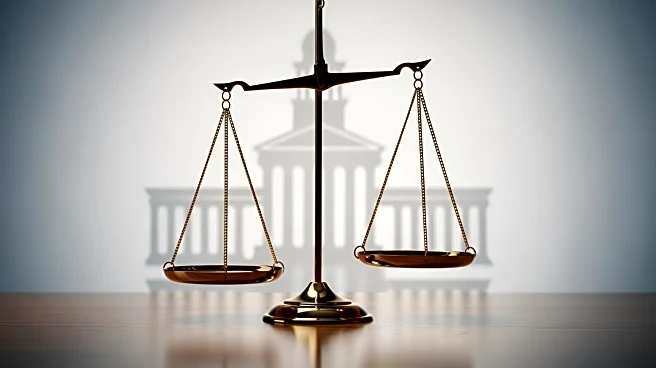What's Happening?
President Trump has warned that the Supreme Court's potential decision to strike down his worldwide import tariffs could leave the U.S. 'defenseless' and 'reduced to almost Third World status.' The tariffs,
which have increased the average U.S. tariff rate to 17.9%, are being challenged for exceeding presidential authority. Despite skepticism from the justices, Trump has several options to continue imposing tariffs, including using powers from previous administrations and statutes like Section 301 of the Trade Act of 1974. These tariffs have been a cornerstone of Trump's foreign policy, justified by declaring trade deficits a national emergency.
Why It's Important?
The Supreme Court's decision on Trump's tariff authority could have significant implications for U.S. trade policy and international relations. If the court rules against Trump, it may limit the president's ability to unilaterally impose tariffs, potentially affecting U.S. economic strategy and trade negotiations. The outcome could also influence the balance of power between the executive and legislative branches regarding trade policy. Businesses and industries reliant on international trade may face uncertainty, impacting economic stability and growth.
What's Next?
If the Supreme Court strikes down Trump's tariffs, the administration may explore alternative legal avenues to maintain its trade policy. This could involve leveraging existing statutes or seeking new legislative authority from Congress. The decision may prompt discussions on the appropriate scope of presidential power in trade matters and the role of Congress in regulating tariffs. Stakeholders, including businesses and trade partners, will be closely monitoring the situation to assess potential impacts on trade relations and economic conditions.
Beyond the Headlines
The challenge to Trump's tariff authority highlights broader questions about the use of emergency powers in trade policy and the balance of power between the executive and legislative branches. The case may set a precedent for future administrations regarding the scope of presidential authority in economic matters. Additionally, the tariffs have sparked debate about their effectiveness in addressing trade deficits and their impact on global commerce. The outcome could influence U.S. trade strategy and its approach to international economic relations.










